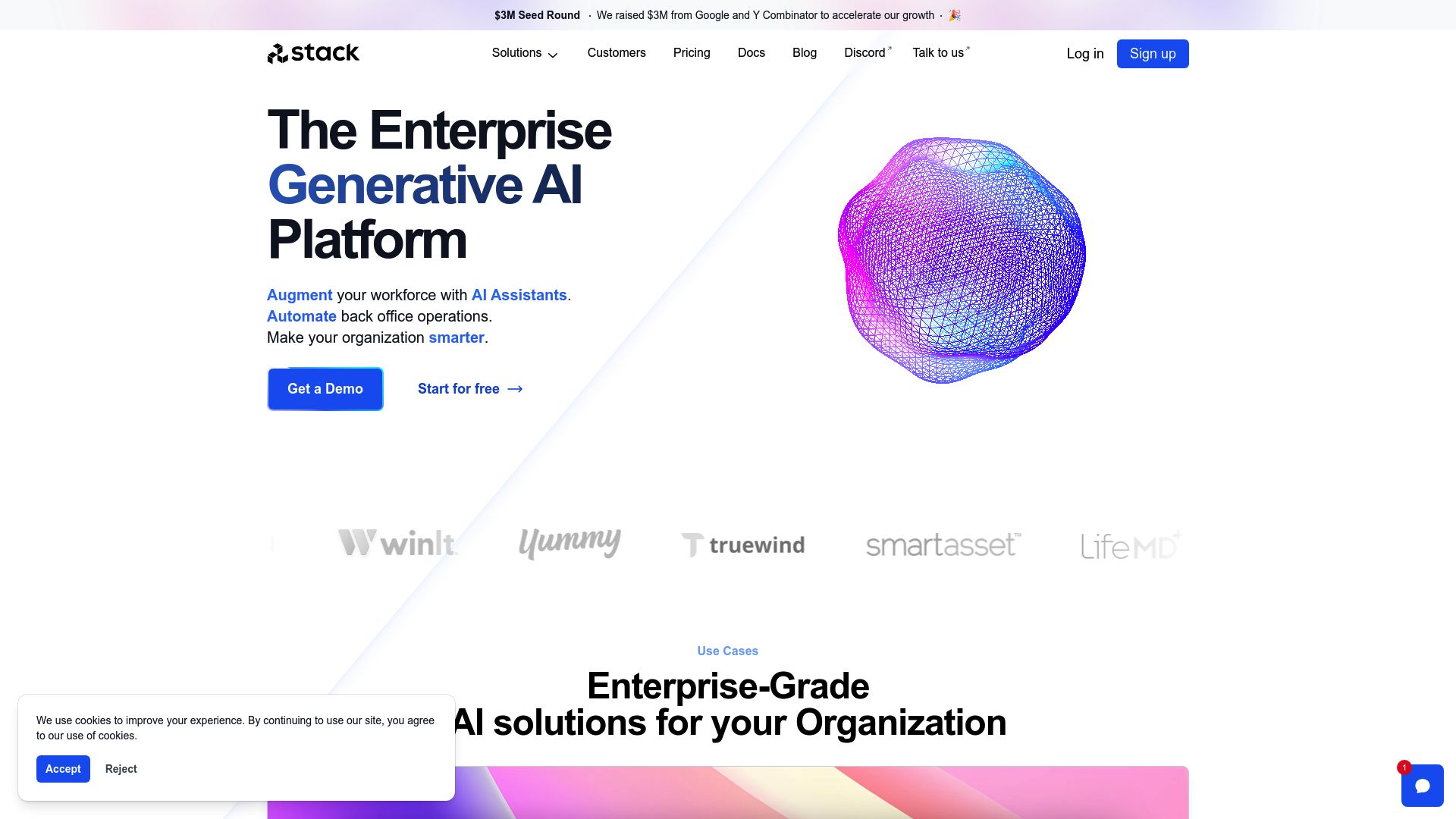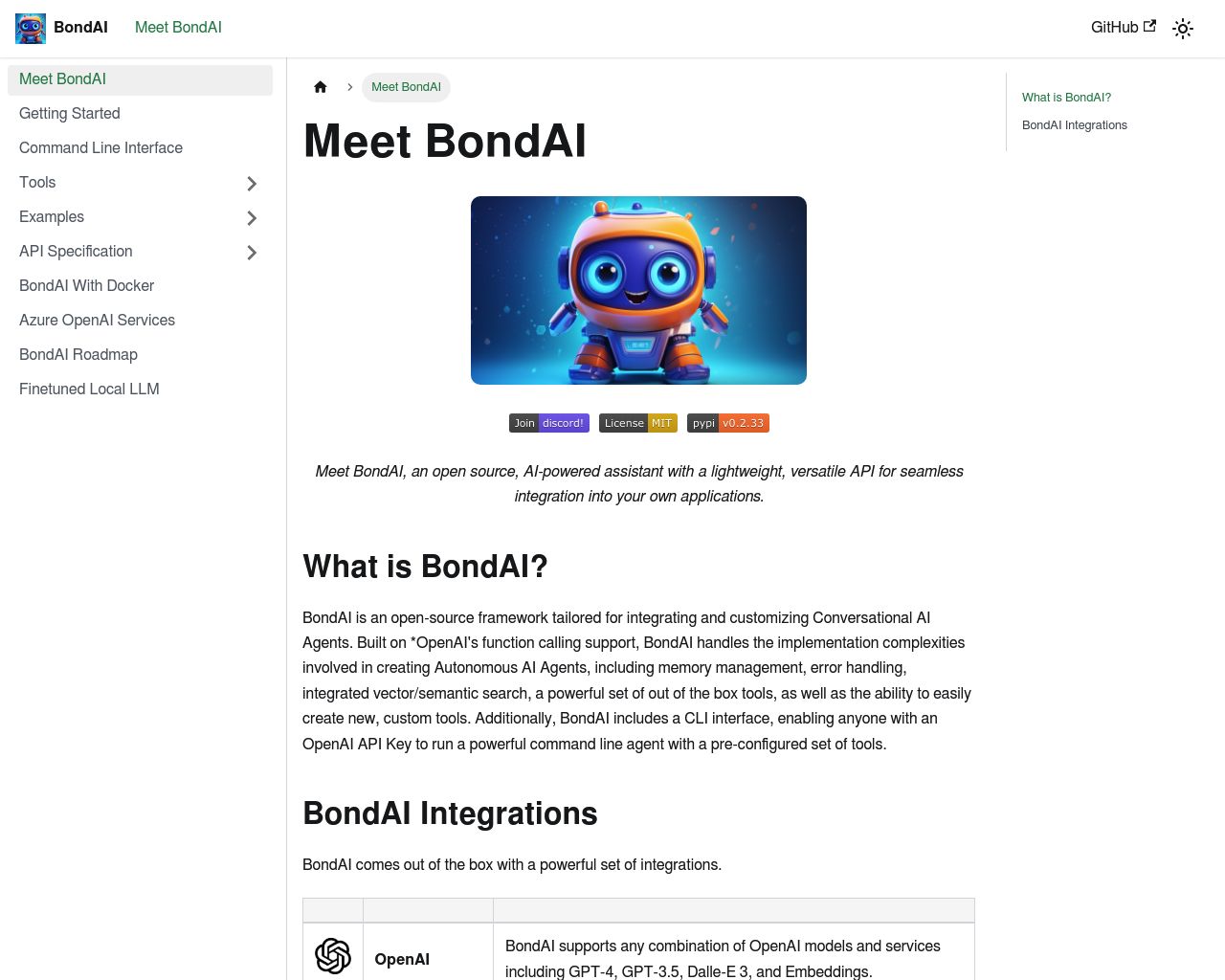Stack AI vs. BondAI: Comparing AI Agent Development Platforms
AI agent development platforms revolutionize how businesses harness artificial intelligence. Stack AI vs. BondAI, and SmythOS each offer unique approaches to creating and deploying AI-powered solutions. This comparison explores their key features, strengths, and limitations to help you choose the right platform for your needs. We’ll examine how these tools cater to different user groups, from non-technical professionals to experienced developers, and evaluate their capabilities in areas such as ease of use, customization, deployment options, and integration ecosystems. By the end, you’ll understand which platform best suits your AI development goals, whether you’re looking to automate workflows, build custom AI assistants, or create complex multi-agent systems.
Stack AI Overview
Stack AI empowers users to create and deploy AI-powered workflows and custom assistants without extensive coding expertise. Its low-code platform democratizes access to advanced AI capabilities, enabling businesses of all sizes to leverage generative AI for process automation and enhanced decision-making.


The platform’s no-code interface features drag-and-drop functionality, making it accessible to users across technical skill levels. Stack AI integrates with various data sources and services, including Google Drive, Salesforce, and Slack, facilitating seamless incorporation into existing workflows. Pre-built templates for common use cases accelerate development, while customization options allow tailoring to specific needs.
Stack AI empowers users to create and deploy AI-powered workflows and custom assistants without extensive coding expertise. Its low-code platform democratizes access to advanced AI capabilities…
Stack AI prioritizes enterprise-grade security, complying with SOC 2, HIPAA, and GDPR standards to ensure data protection and privacy. Users can deploy their AI applications through customizable interfaces or API endpoints, offering flexibility in implementation. The platform supports both development and production environments, enabling thorough testing before live deployment.
While Stack AI offers robust features, its effectiveness depends on the quality of data and specific use cases. Users may face challenges in complex integrations or highly specialized applications. The platform’s scalability and performance under high-volume scenarios warrant consideration for enterprise-level deployments. Despite these potential limitations, Stack AI’s combination of accessibility and advanced AI capabilities positions it as a valuable tool for organizations seeking to harness AI-driven automation and insights.
BondAI Overview
BondAI empowers developers to build advanced AI agent systems with its open-source framework. The platform simplifies complex tasks like memory management, error handling, and semantic search, enabling the creation of sophisticated AI agents.


BondAI supports cutting-edge AI architectures, including ReAct Agents for reasoning and action capabilities, and ConversationalAgents inspired by the AutoGen framework. These features allow developers to create both individual agents and multi-agent systems capable of tackling complex tasks collaboratively.
BondAI empowers developers to build advanced AI agent systems with its open-source framework. The platform simplifies complex tasks like memory management, error handling, and semantic search…
The framework integrates seamlessly with popular services like OpenAI’s models, Microsoft Azure, Google Search, and LangChain. This extensive integration makes BondAI versatile for applications ranging from research and trading to home automation and customer support.
A standout feature of BondAI is its robust memory management system, inspired by the MemGPT paper. Using a tiered approach with core, conversation, and archival memory, BondAI efficiently manages extensive contexts and complex conversations, enhancing problem-solving capabilities.
BondAI offers flexibility in implementation, available via CLI, Docker containers, or direct integration into codebases. This versatility allows users to quickly start with pre-configured tools or build custom agents tailored to specific needs.
Feature Comparison
Stack AI and BondAI offer distinct approaches to AI agent development, each with its own strengths and limitations. Stack AI provides a low-code platform with a user-friendly drag-and-drop interface, making it accessible to users across technical skill levels. In contrast, BondAI is an open-source framework that caters more to developers and researchers, offering greater flexibility for custom agent development.
While both platforms support AI agent creation, Stack AI’s visual builder and no-code options surpass BondAI’s offerings in terms of ease of use for non-technical users. Stack AI also provides more robust enterprise-grade security features, including SOC 2, HIPAA, and GDPR compliance. BondAI, however, excels in its advanced memory management system, inspired by the MemGPT paper, which allows for more sophisticated handling of extensive contexts and complex conversations.
In terms of deployment options, Stack AI offers a wider range of out-of-the-box solutions, including site chat and scheduled agents. BondAI, while flexible, requires more technical expertise to achieve similar deployments. Stack AI’s pre-built templates and extensive integrations with popular services give it an edge in rapid deployment scenarios, whereas BondAI’s open-source nature allows for deeper customization at the cost of development time.
Feature Comparison Table
| Stack AI | BondAI | SmythOS | |
|---|---|---|---|
| CORE FEATURES | |||
| Visual Builder | ✅ | ❌ | ✅ |
| No-Code Options | ✅ | ❌ | ✅ |
| Audit Logs for Analytics | ✅ | ❌ | ✅ |
| SECURITY | |||
| Constrained Alignment | ❌ | ❌ | ✅ |
| IP Control | ❌ | ❌ | ✅ |
| COMPONENTS | |||
| Huggingface AIs | ❌ | ✅ | ✅ |
| Data Lakes | ✅ | ❌ | ✅ |
| DEPLOYMENT OPTIONS (EMBODIMENTS) | |||
| Staging Domains | ✅ | ❌ | ✅ |
| Deploy as Scheduled Agent | ❌ | ❌ | ✅ |
| DATA LAKE SUPPORT | |||
| Hosted Vector Database | ✅ | ❌ | ✅ |
| Sitemap Crawler | ❌ | ❌ | ✅ |
| YouTube Transcript Crawler | ❌ | ❌ | ✅ |
Best Alternative to Stack AI and BondAI
SmythOS stands out as a superior alternative to Stack AI and BondAI, offering a comprehensive platform for AI agent development and deployment. Our drag-and-drop interface surpasses Stack AI’s low-code approach, providing even greater accessibility to users across all technical skill levels. Unlike BondAI’s open-source framework that caters primarily to developers, SmythOS democratizes AI creation for both technical and non-technical users.
SmythOS stands out as a superior alternative to Stack AI and BondAI, offering a comprehensive platform for AI agent development and deployment.
We excel in ease of use, featuring a robust visual builder and extensive no-code options that outshine both Stack AI and BondAI. Our platform boasts a wider array of pre-built integrations and templates, accelerating development and deployment processes. SmythOS supports multi-agent collaboration, allowing for more complex and efficient AI systems than our competitors.
In terms of feature set, SmythOS offers unparalleled versatility. We provide advanced capabilities such as constrained alignment and IP control, ensuring better security and alignment with organizational goals – features notably absent in both Stack AI and BondAI. Our platform also includes unique functionalities like a sitemap crawler and YouTube transcript crawler, expanding the range of data sources available for AI training and operation.
SmythOS truly shines in its unlimited use cases. While Stack AI and BondAI may excel in specific areas, our platform’s flexibility allows for the creation of AI agents for virtually any application. From customer service chatbots to complex data analysis tools, SmythOS empowers users to build AI solutions tailored to their exact needs. This versatility, combined with our user-friendly interface and robust feature set, makes SmythOS the ideal choice for businesses and individuals looking to harness the full potential of AI technology.
SmythOS truly shines in its unlimited use cases… our platform’s flexibility allows for the creation of AI agents for virtually any application.
Conclusion
Stack AI, BondAI, and SmythOS each offer unique approaches to AI agent development, catering to different user needs and technical expertise levels. Stack AI’s low-code platform and user-friendly interface make it accessible to non-technical users, while BondAI’s open-source framework provides developers with greater flexibility for custom agent creation. However, SmythOS emerges as the superior choice, combining the best of both worlds with its intuitive drag-and-drop interface and powerful customization options.
SmythOS stands out with its extensive integration ecosystem, supporting over 300,000 integrations and a wide range of AI models from various providers. This versatility allows users to create complex AI workflows that seamlessly connect to multiple data sources, APIs, and tools. The platform’s ’Create Once, Deploy Anywhere’ approach further enhances its utility, enabling users to deploy AI agents across numerous platforms and services with ease.
For businesses and developers seeking a comprehensive AI solution, SmythOS offers unparalleled value. Its multi-agent orchestration capabilities, pre-built templates, and versatile deployment options streamline the AI development process, making it 99% faster than traditional methods. Whether you’re looking to create APIs, chatbots, or complex AI-driven applications, SmythOS provides the tools and flexibility to bring your ideas to life.
Create a free SmythOS account today and experience the future of AI agent development. With our risk-free trial offering unlimited agents and a 30-day money-back guarantee, you can explore the full potential of SmythOS without commitment. Discover our diverse range of AI-powered agent templates to jumpstart your projects and revolutionize your workflow. Join the AI revolution and unlock new levels of efficiency and innovation with SmythOS.
Last updated:
Disclaimer: The information presented in this article is for general informational purposes only and is provided as is. While we strive to keep the content up-to-date and accurate, we make no representations or warranties of any kind, express or implied, about the completeness, accuracy, reliability, suitability, or availability of the information contained in this article.
Any reliance you place on such information is strictly at your own risk. We reserve the right to make additions, deletions, or modifications to the contents of this article at any time without prior notice.
In no event will we be liable for any loss or damage including without limitation, indirect or consequential loss or damage, or any loss or damage whatsoever arising from loss of data, profits, or any other loss not specified herein arising out of, or in connection with, the use of this article.
Despite our best efforts, this article may contain oversights, errors, or omissions. If you notice any inaccuracies or have concerns about the content, please report them through our content feedback form. Your input helps us maintain the quality and reliability of our information.
